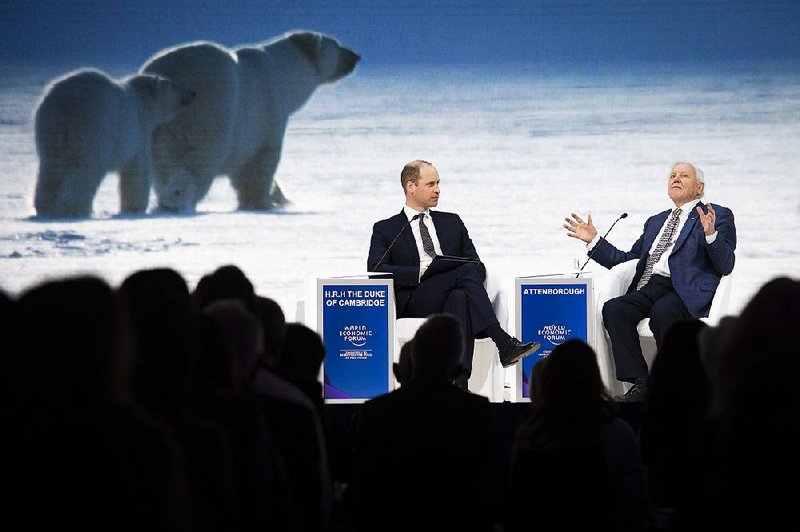DAVOS, Switzerland -- Brazilian President Jair Bolsonaro pledged to work "in harmony with the world" to cut carbon emissions, aiming to quell international concerns about whether his country, the main custodian of the oxygen-rich Amazon, will put economic interests over environmental ones.
The environment dominated talks Tuesday at the World Economic Forum, and the nationalist leader struck a conciliatory tone in a keynote speech -- a far cry from the combative one he had taken on the campaign trail when he once threatened to join the United States and pull Brazil out of the Paris climate accord, which set a limit on global warming.
Minutes after famed naturalist David Attenborough spoke of the challenges involved in fighting climate change, saying, "It's difficult to overstate the climate change crisis," Bolsonaro chose his words carefully in pledging to work with other countries to cut carbon emissions while also freeing up business.
"The environment must go hand in hand with development efforts: One should not of course emphasize one more than the other," Bolsonaro told a nearly packed hall in the Swiss resort town, which responded with polite applause.
"We plan to work in harmony with the world, and in sync with the whole world, in terms of decarbonizing the economy, reducing CO2 emissions, and of course preserving the environment," he said in a speech that was short on details.
During the campaign, Bolsonaro vowed to pull Brazil from the Paris accord -- only to backtrack after winning and promising to stay. Scientists say Brazil won't be able to meet its emission targets if he rolls back environmental regulations and opens up more of the oxygen-rich Amazon to mining and farming.
He also sought to play up Brazil's economic prospects at an event that has long represented business interests and proponents of global trade. But globalism is in retreat as populist leaders put a focus back on national interests, even if that means limiting trade and migration.
With some key Western leaders absent -- like Britain's Theresa May, saddled by worries over the EU exit, and U.S. President Donald Trump sitting out over the government shutdown -- environment advocates sought to fill the void and raise their voices at the annual gathering in the Swiss snows.
Interviewed by royal-turned-quasi-journalist Prince William at Davos on Tuesday, Attenborough drew a standing ovation after warning them that the planet faces destruction if climate change is not dealt with imminently -- a far cry from the start of his career making natural history programs in the 1950s when the world had the feel of the "Garden of Eden."
"We are seeing that almost everything we do has its echoes and has its implications across the natural world," Attenborough said. "The mechanisms that we have for destruction are so wholesale and so frightening that we have actually exterminated whole ecosystems without even noticing."
Attenborough, whose new documentary series Our Planet is to be released by Netflix this spring, said that if the world keeps on the path it's chosen, then much of the damage heaped on the environment from industrialization and population growth can start to be reversed.
Those who wanted to hear from the Trump administration had to make do with a video appearance by Secretary of State Mike Pompeo, who spoke by video conference from the balcony of the State Department, with the Lincoln Memorial over his left shoulder.
Pompeo delivered a faithful summary of Trump's "America First" foreign policy, with harsh words for Iran and China. He told the audience that Trump's brand of disruption was a healthy response to voters who had turned away more traditional politicians, and mirrored political upheavals in Britain, France, Italy and Brazil.
Information for this article was contributed by Jamey Keaten, Pan Pylas, Masha Macpherson and Peter Prengaman of The Associated Press and by Mark Landler of The New York Times.
Business on 01/23/2019

